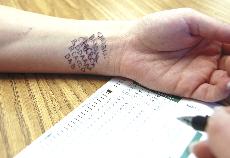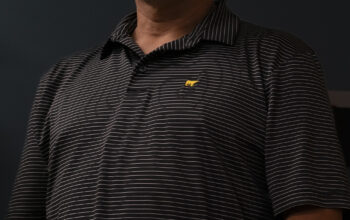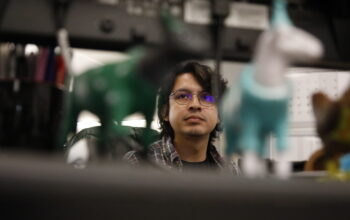A fail. A zero. Suspension. Possible expulsion. An Academic Dishonesty Report on file.
These are the possible disciplinary actions for cheating.
The decision to cheat or not to cheat remains fully in the student’s own hands. The consequences can be severe and may end up costing a lot in the long run.
Schuyler McKaig, professor of speech, noticed that while one student was giving a speech, it sounded a lot different than their previous speeches.
The general policy is an F on the assignment, which the student received.
They were then reported to the dean of students.
As McKaig followed protocol he said, “It creates a difficult situation and is out of your hands.”
He hoped that it wouldn’t happen, but it is something he’s very aware of.
“The policy is in the schedule of classes,” said McKaig. “When you’re caught you have no justification for your actions.”
McKaig’s advice: “Just don’t do it. I think a lot of people think that everyone cheats and they think it’s okay.”
Wearing hats, using cell phones and writing on hands and arms are a few of the “old school” ways students cheat. New forms of technology are now used to get the better grade.
Bluetooth technology on handheld personal digital assistants can feed answers from outside a classroom.
Bluetooth allows devices to communicate with each other without cables or wires.
“Working on your peripheral vision helps,” said a nursing student who would like to remain anonymous.
“I have a friend who put a list of definitions in really small font inside a pen. He has the mind of a criminal.”
“Most teachers are pretty oblivious as to what’s going on,”Camera phones can take and transmit pictures of tests or send silent text messages to request or provide answers.
MP3 players can hold downloaded notes as easily as they can hold music.
According to reports in technology magazines, the candy, Mentos, is often used as a cheat sheet. Due to its long paper label it can be unrolled and flattened.
One case of using technology to cheat was using a keystroke decoder.
It was placed on the back of a teacher’s computer.
The device logs everything that is typed, including passwords.
This allowed for stealing and selling the tests.
The punishment for this one was a misdemeanor.
A cheat sheet folded up on a student’s lap or answers written on the bottom of a box of tissues have also been utilized.
Kathy Oborn, criminal justice professor, stated, “Students would pre-mark their scantrons and professors would notice it.
“I used to be the dean of discipline and all the students were sent to me,” she continued. “Students wrote answers on their hands.”
Oborn feels, “They’re not serving themselves by not learning the material, they are only cheating themselves.”
One incident that sticks out the most was when two students in a lab were getting the same answers.
Neither would divulge which was the “cheater.”
They were tested separately and both scored well.
With the Google search engine, there are many texts to plagiarize from.
Printing notes on the inside of water bottle labels and writing on the inside of LIVESTRONG bracelets have also been pioneered.
As digital technology gets smaller and less expensive, malicious usage of them will increase.
USB flash drives can copy large amounts of information.
Graphing calculators have been used for storing words as well as numbers.
“In this day and age you can do almost anything, but you’re better off studying,” stated James Gross, a student whose major is undecided.
In Gross’ accounting class, a student wanted to use the calculator on their cell phone during an exam. The professor allowed it, but the possibility of cheating was there.
Gross has “been through grade school, high school and now college and have witnessed cheating throughout.”
As far as those copying off of him, he admitted that he let them because they were going to do what they wanted.
Psychology professor Sue Meier is no stranger to the act of cheating.
She had three students sitting in a row during a test. The one in the middle was apparently the one with all of the answers, and Meier noticed the others looking at her paper
As a result, she now has to make multiple copies of tests.
Meier insisted, “If you spent the time studying, you wouldn’t have to come up with these gimmicks of cheating and you’d probably do pretty well.”
Cheating happens all the time. Whether it is temptation or a lack of studying, it is all around.
Margarete Allen, professor of physics, stated, “I would like very much to treat people honorably, but now I have to treat people as cheaters.”
“I feel like I’m treating everyone as a cheater right off the bat,” Allen said

Some students cheat with classic methods, however many students lately are using more high-tech methods such as cell phones and mp3 players. ()



